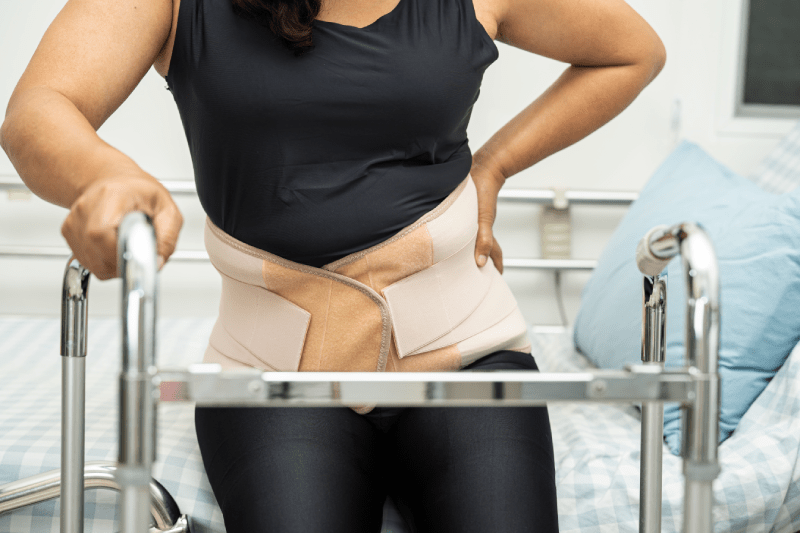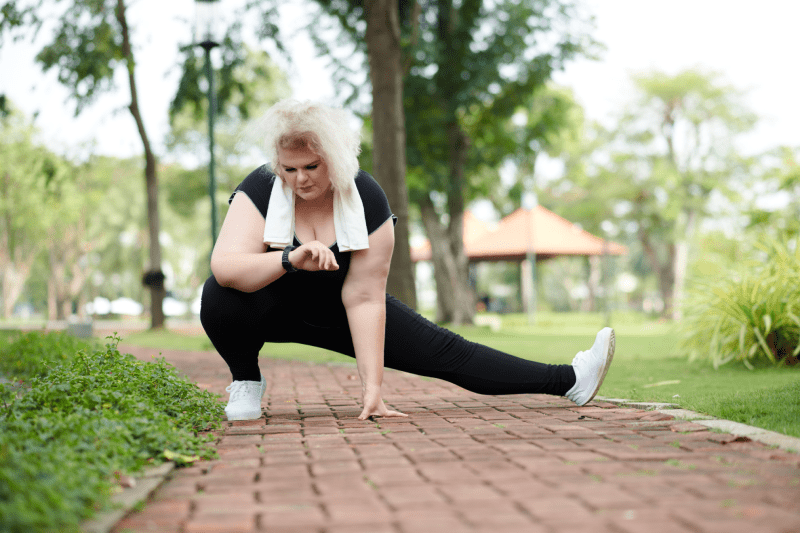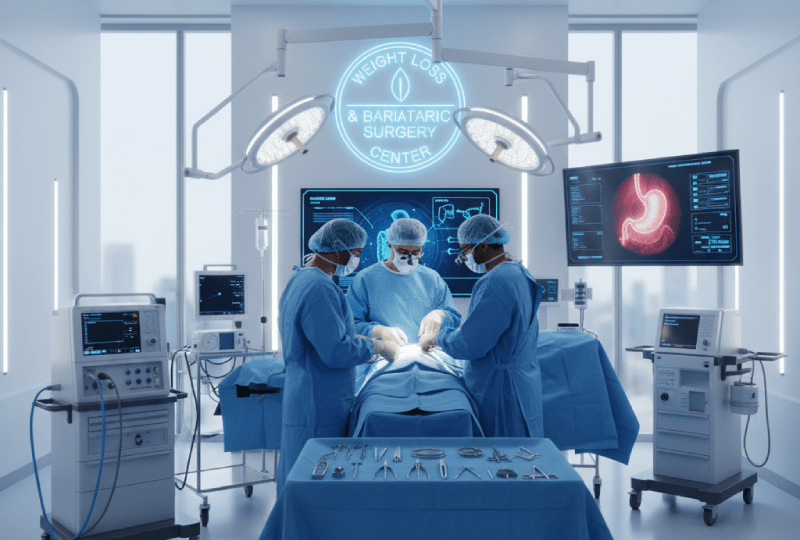What Is Gastric Sleeve Surgery And How Does It Work?
Gastric sleeve surgery is one of the most commonly performed methods in bariatric surgery and involves the permanent removal of approximately 70 to 80 percent of the stomach volume. This surgical procedure makes the stomach take the shape of a banana. The surgery has two main effects: First, because a large part of the stomach is removed, the patient feels full with less food (restriction).
Second, because the stomach fundus, where the appetite hormone Ghrelin is largely secreted, is removed, the patient’s appetite significantly decreases. This hormonal and restrictive mechanism enables the patient to lose weight at a healthy pace and permanently. The gastric sleeve is just a tool, and long-term success depends on the patient changing their lifestyle.
Why Are Gastric Sleeve Prices More Affordable In Marmaris?
Marmaris stands out in health tourism by offering attractive prices. The primary reasons why gastric sleeve surgery prices in Turkey are more affordable compared to Western Europe and the USA are the low general operating costs, personnel expenses, and laboratory fees. Additionally, the advantageous foreign exchange rate for international patients is a significant factor. Modern hospitals in Marmaris, which comply with international standards, provide services with latest technology surgical equipment and experienced surgical teams despite the cost advantage. This situation allows patients to receive budget-friendly treatment without compromising quality.
Who Is A Suitable Candidate For Gastric Sleeve Surgery?
Suitable candidates for gastric sleeve surgery are generally individuals with a Body Mass Index (BMI) of 40 and above or those with a BMI between 35-40 who have co-morbidities like type 2 diabetes, high blood pressure, or sleep apnea related to obesity. Candidates must also have attempted and failed non-surgical weight loss methods (diet, exercise, medication). Most importantly, patients are expected to be psychologically and physically ready to accept the surgery as a permanent solution and adhere to lifelong diet and lifestyle changes. These criteria are critical for the long-term success of the surgery.
What Is The Surgery Process Like And How Long Does It Last?
Gastric sleeve surgery is predominantly performed using the laparoscopic (keyhole) method today. This method involves using special surgical instruments delivered to the stomach through several small incisions (keyholes) instead of a large incision in the abdomen. The surgeon proceeds through these incisions, separating and removing approximately 70-80% of the stomach. The surgery itself usually lasts between 1 to 3 hours, depending on the surgeon’s experience. Thanks to the laparoscopic method, patients experience less pain, the hospital stay is shorter, and the recovery process is accelerated, which is a major advantage for health tourism patients in Marmaris.
How Many Days In Total Is Necessary To Allocate For Treatment In Marmaris?
For patients coming from abroad, gastric sleeve surgery treatment in Marmaris generally requires a total stay of 7 to 10 days. This duration is vital for the safe progression of the process. The first few days are reserved for detailed pre-tests, consultations, and preparation for surgery. After the surgery, patients stay in the hospital for 3 to 4 nights. The remaining time (to complete the 10 days in total) is spent resting in comfortable post-hospital accommodation for close monitoring of possible early complications, ensuring fluid intake is established, and adequate recovery for air travel is achieved.
What Tests And Preparations Must Be Done Before The Surgery?
Preparation before gastric sleeve surgery is meticulously carried out to minimize surgical risks and definitively confirm the patient’s suitability. Required tests include: Comprehensive blood tests (liver, kidney functions, blood count, vitamin levels), cardiology examination (ECG, stress test if necessary), respiratory function tests, and endoscopy (to check the inside of the stomach). Additionally, a psychiatry/psychology assessment may be requested to evaluate any eating disorders or psychological barriers the patient may have. Patients are also required to start a special liquid diet for 1-2 weeks before the surgery to shrink the liver.
How Long Is The Hospital Stay After The Surgery?
The hospital stay after gastric sleeve surgery typically varies between 3 to 4 nights, depending on the patient’s general health condition and recovery speed. During this period, the patient’s vital functions are closely monitored. The most critical stage is the leak test performed the day after the surgery, which checks for any leakage. During the hospital stay, pain control is ensured, the patient is supported in taking their first walks, and the transition to liquid foods is initiated under the supervision of a doctor and dietitian. This is the fundamental condition for the patient’s safe discharge.
How Is Pain Management Provided After The Surgery?
Although gastric sleeve surgery is less painful than large incisions because it is performed laparoscopically, pain control is still important in the first few days. In modern hospitals, Patient-Controlled Analgesia (PCA) pumps or powerful intravenous painkillers administered at regular intervals are generally used for post-operative pain management. Painkillers are regulated to ensure the patient is comfortable and mobile, especially in the first 48 hours. After being discharged from the hospital, the patient continues the comfortable recovery process at home with effective oral painkillers.
What Is The Long-Term Success Of Gastric Sleeve Surgery?
The long-term success of gastric sleeve surgery depends not only on the surgical technique but largely on the patient’s commitment to permanent lifestyle changes. In successful patients, usually 60 to 70 percent of the excess weight is permanently lost. The success of the surgery is measured not only by weight loss but also by the recovery rates of co-morbidities related to obesity (diabetes, hypertension). For the long-term effect of the surgery to be sustained, the patient must adhere to protein-rich nutrition, regularly use vitamin supplements, and engage in regular physical activity for life.

How Does The Nutrition Regimen Change After The Surgery?
The nutrition regimen after surgery involves a multi-stage transition process to acclimate the stomach to its new size and support healthy healing. This process usually begins with clear liquids during the first few days spent in the hospital. This is followed by a transition to pureed, soft solid, and normal solid foods, respectively. This transition period lasts approximately 4 to 6 weeks. The most important rule during this period is to focus on high protein intake, eat small portions, chew food very well, and absolutely avoid carbonated, sugary, high-fat beverages and foods.
What Is The Leak Test And Why Is It Performed?
The leak test is the most critical safety check performed in the hospital after gastric sleeve surgery. In this test, performed the day after the surgery, the patient is given a special contrast agent (usually blue dye or a liquid visible on X-ray) to drink, and an X-ray or CT scan is performed. The purpose of this test is to check for any leakage or seepage along the staple line (incision line) where the stomach was reduced. Since leakage is one of the most serious complications of the surgery, no liquid food is given to the patient, and discharge is not planned until the result of this test is positive.
What Are The Most Common Post-Operative Complications?
Although gastric sleeve surgery is made low-risk with modern techniques, some complications can occur. The most serious but rare complication is the risk of a leak at the staple line, which requires emergency intervention. Other common complications include bleeding (usually stops on its own) that can occur within the first 24 hours after surgery, infection, hernia formation at the surgical site, and the risk of deep vein thrombosis (DVT – blood clot) in the legs. It is vital for patients to mobilize early and regularly use blood-thinning medications to reduce the risk of DVT.
What Are The Quality Standards Of Hospitals In Marmaris?
Hospitals in Marmaris that provide bariatric surgery services generally meet international health standards. These centers are subject to the approval of the Turkish Ministry of Health and strict inspections. Quality hospitals are equipped with latest technology surgical equipment, advanced sterilization units, and comprehensive intensive care units (ICUs) ready for possible complications. This high standard of hygiene and technology offered to foreign patients is one of the main reasons why Marmaris is preferred as a health tourism center.
When Can Exercise Be Started After The Surgery?
The process of starting an exercise program after surgery should be gradual, depending on the patient’s recovery speed. Patients are encouraged to start light walks immediately after the surgery, even while in the hospital, to reduce the risk of DVT. Moderate-intensity cardio or walking can generally be started after 3 to 4 weeks. However, starting heavy lifting, core-strengthening exercises, and intense sports that increase intra-abdominal pressure and put strain on the staple lines usually requires waiting 6 to 8 weeks. The goal of exercise is to accelerate the weight loss process and preserve muscle mass.
Is There A Risk Of Failure Or Weight Regain After The Surgery?
The risk of technical failure of gastric sleeve surgery (i.e., the stomach not being sufficiently reduced) is quite low in experienced hands. However, there is a risk of weight regain after the surgery. This situation usually stems from behavioral errors such as the patient continuing to consume high-calorie liquid or soft foods (ice cream, milkshake, sugary drinks) despite the physical restriction of the surgery. The surgery is a tool; for permanent success, the patient must fundamentally change their eating habits and ensure psychological compliance. The risk of long-term weight regain can be minimized with disciplined follow-up and lifestyle changes.
What Vitamin Supplements Must Be Used After Gastric Sleeve Surgery?
After gastric sleeve surgery, the absorption of some vitamins and minerals decreases due to the reduction of the stomach and the change in nutrient absorption. Therefore, patients are required to use vitamin and mineral supplements regularly for life. The most critical supplements are: Vitamin B12 (often in injectable form), Vitamin D, Calcium (for bone health), and Iron (especially for female patients). All these supplements should be taken at personalized doses based on blood test results and the dietitian’s recommendation, as serious health problems may arise otherwise.
Is Hair Loss Experienced After The Surgery And How Is It Prevented?
Temporary hair loss is quite common and normal, usually occurring between 3 to 6 months following gastric sleeve surgery. This shedding is caused by the stress (telogen effluvium) created by the surgery and rapid weight loss on the body, and the failure of sufficient nutrients to reach the hair follicles as the body focuses on vital organs during this process. To prevent or minimize hair loss, patients must prioritize high protein intake and regularly use supplements like zinc, biotin, and B vitamin complexes recommended by the doctor. The shedding usually stops on its own once the rate of weight loss slows down.
What Is The Difference Between Gastric Balloon Or Botox?
Gastric sleeve surgery differs from non-surgical methods like gastric balloon or Botox fundamentally by creating a permanent anatomical change. While the gastric balloon provides temporary volume restriction, and Botox temporarily slows down the stomach’s contraction force, the gastric sleeve permanently removes a part of the stomach, which not only restricts volume but also permanently lowers the levels of the Ghrelin hormone that controls appetite. Therefore, the gastric sleeve is a surgical solution offering much higher weight loss rates and a stronger curative effect on obesity-related diseases.
When Can I Start Driving A Car After The Surgery?
Patients are strongly advised to avoid driving a car for at least 1 week after gastric sleeve surgery. The strong painkillers used after the surgery can slow down reflexes. Furthermore, the incision sites and internal sutures in the abdominal area can be strained by the contraction of abdominal muscles during movements like sudden braking or turning the steering wheel. This tension can cause pain and slow down healing. It is safe for the patient to drive only when they have stopped using painkillers, can comfortably wear the seatbelt, and can perform sudden movements without pain.

How Visible Are The Surgical Scars (Incisions)?
Gastric sleeve surgery leaves no large surgical scar because it is performed using the laparoscopic (keyhole) method. The surgeon makes usually 3 to 5 small incisions, each 0.5 to 1.5 cm long, in the abdominal area. These incisions are generally placed in concealed areas for aesthetic reasons. Scars may be red and prominent in the first few months, but with proper wound care, massage, and sun protection, they fade to near skin color and become barely noticeable within a year. Minimal invasiveness is an important cosmetic advantage for patients choosing Marmaris.
How Does Smoking And Alcohol Consumption Affect The Surgery?
Smoking and alcohol consumption negatively and dangerously affect the gastric sleeve surgery process and outcomes. Smoking slows down wound healing, increases the risk of infection, and most importantly, multiplies the risk of a leak at the staple line. Alcohol, in addition to being high in calories, increases the stomach’s sensitivity and intolerance to alcohol after the surgery and can also cause liver damage. Therefore, it is a vital necessity for patients to completely quit smoking and alcohol for at least 4 weeks before and at least 6 months after the surgery.
When Is It Safe To Become Pregnant After The Surgery?
It is strongly advised to wait at least 18 to 24 months before becoming pregnant after gastric sleeve surgery. This waiting period is mandatory for two main reasons: First, the body needs to complete the rapid weight loss process and the weight needs to stabilize. Second, vitamin and mineral levels, which are vital for the health of the mother and fetus, need to be balanced and fully absorbed. Becoming pregnant during this period can create serious nutritional deficiencies and health risks for both the mother and the baby.
How Is Skin Sagging Managed After Bariatric Surgery?
When rapid and significant weight loss occurs with gastric sleeve surgery, skin sagging (excess skin) is an unavoidable situation, especially in the abdomen, arms, legs, and breast areas. There are two main methods for managing this situation: First, trying to preserve skin elasticity with regular exercise to increase muscle mass and plenty of water intake to support the weight loss process. The second, and usually the definitive solution, is body contouring surgery (lifting operations) to surgically remove the excess skin after the patient has reached the target weight and the weight has remained stable for at least 6 months.
Which Diseases Are Cured By Gastric Sleeve Surgery?
Gastric sleeve surgery is not just a cosmetic procedure but also a metabolic surgery that significantly improves or puts into remission many chronic diseases associated with obesity. The highest recovery rates are seen in Type 2 Diabetes; after the stomach is reduced, the release of intestinal hormones changes, increasing insulin sensitivity. Also, high blood pressure (hypertension), sleep apnea, and obesity-related joint pain significantly improve or completely disappear with weight loss. These improvements fundamentally enhance the patients’ quality of life.
When Can I Travel By Plane After The Surgery?
The decision to travel by plane after gastric sleeve surgery should be made carefully due to the severity of the operation. Due to the risk of deep vein thrombosis (DVT – blood clot), which is one of the biggest risks after surgery, patients are generally required to stay in Marmaris for at least 7 to 10 days. This risk increases during air travel; therefore, patients must wear compression stockings, take frequent short walks, and drink plenty of water during the journey. Seeking doctor’s advice on additional precautions for long flights is mandatory.
Are Accommodation And Transfers Included In The Packages In Marmaris?
Bariatric surgery centers in Marmaris generally offer comprehensive “all-inclusive” packages for the comfort and logistical ease of international patients. These packages include, in addition to surgical and hospital costs, all VIP transfers between the airport, hospital, and hotel from the patient’s arrival in Marmaris to their departure. Additionally, comfortable hotel accommodation near the hospital is usually part of the package for the post-discharge follow-up period (3-4 nights). This allows patients to focus entirely on their treatment process.
In Which Cases Cannot Gastric Sleeve Surgery Be Performed?
Gastric sleeve surgery cannot be performed, or a more suitable bariatric surgery (such as Gastric Bypass) may be recommended, when certain medical conditions are present. Conditions that prevent surgery include: Uncontrolled severe Type 2 Diabetes (bypass is more effective), high-grade reflux disease (surgery can worsen reflux), and high anesthesia risk conditions like severe heart failure or recent heart attack. Additionally, active alcoholism, drug addiction, or psychological barriers preventing compliance with post-surgical lifestyle changes are also contraindications.

Is Nausea And Vomiting Common After The Surgery?
Nausea and vomiting are common during the first liquid diet phase after surgery. This is usually caused by the patient eating too fast, taking too large sips, or consuming too much liquid for the new size of the stomach. Nausea can be easily controlled with medication. It is mandatory for the patient to pay attention to their eating speed, take food sip by sip and slowly to prevent vomiting. After the first few weeks, as the stomach adapts to its new size, this condition decreases and is rarely seen in patients who adhere to proper nutrition rules.
How Is Long-Term Follow-Up Managed After The Surgery?
Gastric sleeve surgery requires lifelong follow-up. Patients remain in constant communication with their clinic even after leaving Marmaris. Follow-up is more frequent during the first year (at 1, 3, 6, and 12 months). Follow-up is carried out through remote tele-consultations, sending blood test results, and regular meetings with the dietitian and surgeon. Special coordinators manage this process for international patients. Long-term follow-up (after the second year) is usually done once a year, and these check-ups are vital for the early diagnosis of vitamin deficiencies and the risk of weight regain.
How Much Does The Quality Of Life Increase After The Surgery?
One of the most significant benefits of gastric sleeve surgery is the dramatic increase in patients’ quality of life. Weight loss improves not only the aesthetic appearance but also mobility, energy levels, and sleep quality significantly. Patients experience a reduction in chronic pain related to obesity, increased participation in social life, and a positive impact on their general psychological health. The surgery offers patients a new start, boosting their self-confidence and opening the door to a more active, healthy life.
Why Is The Pre-Operative Diet Necessary?
The pre-operative diet is absolutely mandatory for the safety of gastric sleeve surgery. The main purpose of this liquid/low-calorie diet, typically followed for 1-2 weeks before the surgery, is to shrink the liver. In obese patients, the liver is often enlarged, and safely retracting the liver with surgical instruments during the surgery reduces the risk of complications. Furthermore, this diet prepares the patient for post-operative liquid nutrition and forms the first step of new eating habits.
What Is The Price Difference Between Gastric Sleeve Surgery And Gastric Balloon?
The price difference between gastric sleeve surgery and the gastric balloon is directly related to the complexity of the procedure, the technology used, and the permanence. The gastric sleeve is a permanent, major surgical procedure performed under general anesthesia, using laparoscopic instruments and staplers, and requires 3-4 days of hospital stay, thus its cost is naturally higher. The gastric balloon is a temporary, non-surgical procedure performed under sedation and does not require hospitalization, thus its price is lower. The higher cost is directly proportional to the risk management, expertise, and the permanence of the results involved in the surgery.
What Are The Aesthetic Outcomes Of Stomach Reduction Surgery?
The aesthetic outcomes of stomach reduction surgery are the significant improvements seen in the patient’s general body contour and proportions. Initially, fat loss becomes pronounced, the body shape slims down, and becomes more proportionate. Patients are generally able to wear their old clothes and gain high self-confidence with their new body shape. However, due to the skin sagging that can occur after major weight loss, the final aesthetic appearance often requires secondary body contouring surgeries (tummy tuck, arm lift, etc.) after weight stabilization.
What Surgical Technology Is Used In The Operation?
The most advanced laparoscopic (keyhole) surgical technology is used in Marmaris hospitals with international standards for stomach reduction surgeries. This technology enables the operation to be performed using high-resolution cameras and special surgical instruments through small incisions (0.5-1.5 cm). Advanced automatic stapling devices (staplers), which are specific to tissue thickness and keep safety at the highest level, are used for cutting and stapling the stomach. The use of this advanced technology reduces the risk of bleeding and leaks, and accelerates the recovery process.
Is There A Translation Service For Patients From Abroad?
Yes, bariatric surgery centers in Marmaris provide professional translation services as standard to ensure international patients do not experience communication problems during the treatment process. Translators actively participate in all consultations with the surgeon, anesthesiologist, and nurses from the moment the patient arrives in Marmaris until their discharge. This service ensures the patient fully and accurately understands medical instructions, potential risks, and post-operative care rules in their native language, thereby maximizing patient safety and comfort.
This detailed set of 35 questions and answers provides a comprehensive guide to the prices, risks, and long-term process of Gastric Sleeve Surgery in Marmaris. To begin your bariatric surgery journey with high safety standards, an experienced team, and in a comfortable tourism environment, and to manage all your treatment and travel organization, we strongly recommend contacting Cure Holiday, who are experts in health tourism. They will make this complex process transparent, safe, and stress-free for you.



